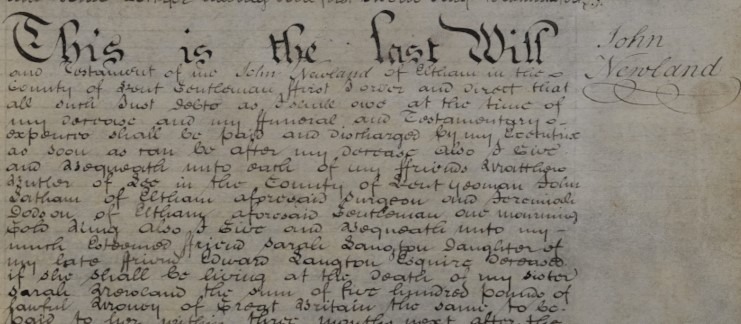The Material Culture of Wills: England 1540-1790
When checking transcriptions you now have to select an option from the dropdown menu - if you have corrected some of the text please choose Corrections made - apologies for the addition of this step, it is to reduce a spate of possibly automated spurious corrections we have found recently.

Help us transcribe wills from the sixteenth to eighteenth centuries, and reveal how ownership of, and attitudes towards, objects changed in a period of economic transformation
Learn moreIf you are familiar with handwriting from this period then you can start by checking machine-generated transcriptions (the 'Checking Transcriptions' workflows) or by transcribing a line from scratch (the 'Transcribing Wills' workflows). Later periods tend to have easier to read handwriting. If you are less familiar with early-modern handwriting or want a refresher then start with the 'Handwriting Training' workflow.
Here is an introductory video guiding you through the 'Checking Transcriptions' workflow.
Zooniverse Talk
Chat with the research team and other volunteers!
The Material Culture of Wills: England 1540-1790 Statistics
View more statsKeep track of the progress you and your fellow volunteers have made on this project.
Every click counts! Join The Material Culture of Wills: England 1540-1790's community to complete this project and help researchers produce important results. Click "View more stats" to see even more stats.
Percent completeBy the numbers
Message from the researcher
By helping us transcribe 25,000 English wills, you'll help make a vital archive of English history more accessible, and contribute to future initiatives to widen access to The National Archives' manuscripts.
The Material Culture of Wills: England 1540-1790About The Material Culture of Wills: England 1540-1790
Wills are the most common personal document to survive before the modern period. They provide evidence of not only what people owned in the past but, through their descriptions and bequests, how they thought about objects. This project will transcribe an unprecedented number of wills from the sixteenth to the eighteenth century and answer the question: how did people's relationship with their possessions change in an era of rapidly increasing trade and commercialisation?
Wills can currently only be accessed as relatively low-quality scans of microfilm copies of the originals. This project will use those low-quality scans, and state of the art handwritten text recognition models to produce transcriptions which will be checked on Zooniverse. This methodology, with your invaluable help, will allow us to open up one of the UK's most important archives, and pave he way for future work on other collections to help everyone better access material that has previously been hard to read or work with due to difficult handwriting or low-quality scans.
The project is based at the Archaeology and History department at the University of Exeter and The National Archives, and is funded by the the Leverhulme Trust.